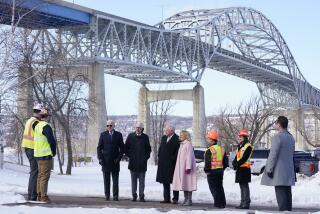Clinton unveils an array of projects for Pakistan
- Share via
Reporting from Islamabad, Pakistan — Secretary of State Hillary Clinton on Monday unveiled an array of development projects -- hydroelectric dams, municipal water supply overhauls, hospital makeovers, even a new mango export initiative -- in hopes of chipping away at the perception many Pakistanis have of an arrogant U.S. oblivious to the power cuts and water shortages that plague their lives.
How Pakistanis perceive the U.S., and the billions of dollars in aid that Washington has set aside for Pakistan, became a major focus of Clinton’s two-day trip to Islamabad, her second since becoming secretary of state. The message she and her team wanted to convey to Pakistanis was clear: The image of an American government that views Pakistan primarily through the prism of fighting terrorism is outdated and unjustified.
To prove her point, Clinton announced a bevy of projects aimed at tackling major infrastructure ills that wreak havoc on everyday life in Pakistan and prevent the country’s moribund economy from getting off the ground. Most of those projects were directed at the country’s electricity and water supply crises.
The list included two hydroelectric dams, one in the mountains of northern Pakistan and the other in the tense tribal region of South Waziristan; 13 irrigation, water storage and municipal water projects across the country; renovation or construction of three hospitals; and overhauls of electrical distribution systems.
The Obama administration has been working to dispel Pakistan’s deep mistrust for the U.S., a wariness rooted in how Washington treated Pakistan in the years following the Soviet withdrawal from Afghanistan in 1988-89. While Moscow occupied Afghanistan, the U.S. and Pakistan teamed up in supporting mujahedin fighters against Soviet troops. But when the Soviets left, the U.S. abandoned the region.
During the Bush administration, the bulk of the billions of dollars in aid that Washington channeled to Pakistan went to the country’s military and the war on terror, while Pakistan’s economic and social ills went largely ignored.
“There’s a legacy of suspicion that we inherited,” Clinton said. “It’s not going to be eliminated overnight. But it’s our goal to slowly but surely demonstrate that the U.S. is concerned about Pakistan for the long term, and that the partnership goes far beyond security against our common enemies.”
A massive economic aid package enacted last year and known as the Kerry-Lugar-Berman effort, was meant to reflect Washington’s desire to reshape the relationship with Islamabad. The package sets aside $7.5 billion over five years to help solve Pakistan’s biggest infrastructure dilemmas and seed economic development. The projects unveiled Monday are either underway or about to be started.
The emphasis on civilian aid was praised by Pakistani leaders, who lauded the progress made by both countries in readying a raft of energy, water and healthcare projects in a matter of months. “It’s no longer talk,” said Pakistani Foreign Minister Shah Mehmood Qureshi. “It’s the implementation phase now, and it’s action-oriented.”
Nevertheless, the Pakistani public is likely to remain wary of Washington’s intentions, in part because Pakistani society still thrives on webs of conspiracy theories that cast doubt and skepticism on the U.S. actions in the region. Strident, clout-wielding voices within the Pakistani media help perpetuate a negative image of Washington, at times claiming that the U.S. engineers suicide bomb attacks in Pakistan, or that an ultimate U.S. goal is to wrest control of Pakistan’s nuclear arms.
Qureshi said that once Kerry-Lugar-Berman projects are completed and begin producing a tangible impact on Pakistanis’ lives, anti-American sentiment probably will die down.
“Opinion in Pakistan will change when they see how, through this partnership, their lives have changed,” Qureshi said. “And in these projects, we are focusing on things that will make a qualitative change in their lives.”
More to Read
Sign up for Essential California
The most important California stories and recommendations in your inbox every morning.
You may occasionally receive promotional content from the Los Angeles Times.










